Many gamers dream of competing in esports tournaments but don’t know how to get into gaming tournaments. Popular games like League of Legends, Dota 2, and Counter-Strike draw millions of players to competitive gaming each year.
This guide breaks down eight simple steps that will help you enter your first video game competition and start your path as a pro gamer. Ready to level up your gaming skills?
Key Takeaways
Choose games with active tournament scenes like League of Legends ($6 million prize pool) or Dota 2 ($40 million International prize pool).
Practice consistently for 2-3 hours daily using platforms like ESEA and study professional gameplay through YouTube tutorials and Twitch streams.
Find tournaments on dedicated platforms including Battlefy, Start.gg, ESL Play, and Challonge for competitions matching your skill level.
Join Discord servers and gaming forums to connect with experienced players, exchange strategies, and discover exclusive tournament opportunities.
Master tournament formats like single elimination, double elimination, and round robin while practicing under actual competition conditions.
Table of Contents
Choosing the Right Game

Picking the right game can make or break your competitive gaming career… and it’s not just about what you enjoy playing. You need to consider factors like tournament frequency, prize money potential, and whether you’re drawn to first-person shooters like Counter-Strike: Global Offensive, MOBAs like League of Legends, or real-time strategy games that demand quick thinking and precise execution.
What game should I choose for competitive play?

Your gaming skills and preferences should guide your choice of competitive game. Assess your strengths first, then match them to game genres that fit your style. MOBA games like League of Legends and Dota 2 demand strategic thinking and team coordination.
First-person shooters such as Counter-Strike: Global Offensive and Overwatch require quick reflexes and precise aim. Battle royale titles like Fortnite and PUBG: Mobile test survival instincts and adaptability under pressure.
Game popularity directly affects tournament opportunities and prize money potential. League of Legends Championship Series draws millions of viewers and offers substantial rewards for top players.
Check the competitive scene’s health before committing time to any title. Real-time strategy games like those from Valve Corporation maintain dedicated communities, while newer titles might lack established tournament structures.
Hardware requirements matter too, your video card and system specs must handle competitive play smoothly. People enter tournaments for everything from online poker to Counter-Strike 2 and many others through some of the best competitions available online.
Understanding the meta and current strategies gives you the edge needed to compete effectively against other video gamers.
Which games have the most active tournament scenes?
Once you pick a game that matches your interests, you need to know which titles offer the best tournament opportunities. Several genres dominate the competitive gaming scene with massive prize pools and active player bases.
Multiplayer online battle arena games like League of Legends lead the pack with a $6 million World Championship prize pool. Dota 2’s The International offers an even bigger reward at $40 million, making it one of the most lucrative esports championships.
First-person shooters such as Counter-Strike: Global Offensive and Valorant host countless tournaments year-round on platforms like Battlefy and Smash.gg. Fighting games including Street Fighter V and Tekken 7 maintain strong communities with regular competitions.
Real-time strategy games like StarCraft II continue to draw dedicated players, while collectible card games such as Hearthstone offer accessible entry points for new competitors.
Console gaming also provides excellent tournament options across Nintendo Switch, Xbox, and PlayStation platforms. Rocket League tournaments attract millions of viewers, while Call of Duty: Modern Warfare events generate significant advertising revenue for organizers.
Battle royale games like Fortnite created history with their $30 million World Cup prize pool. Popular titles like Clash Royale and Smite run regular competitions using swiss system tournaments and double elimination brackets.
Professional gamers from teams like Cloud9 and London Spitfire compete in these events, often streaming their matches on Twitch to build their social media presence.
The best tournament scenes combine large prize pools with active communities that support both amateur and professional players.
Developing Your Skills
Building solid game skills takes time, dedication, and smart practice methods. Pro gamers didn’t reach their matchmaking rating overnight—they spent countless hours perfecting their craft through focused training sessions, studying gameplay footage, and learning from their mistakes in both casual matches and competitive environments.
How can I practice effectively to improve game mechanics?

Commit to consistent practice, focusing on skills until they become second nature. Use in-game matchmaking systems to find opponents at your skill level. Services like ESEA provide better competition than standard matchmaking rating systems.
Practice specific combos, movement patterns, and timing in training modes daily. Set aside at least two hours each day for focused skill development.
Watch professional video gamers’ live streams and YouTube channels for insights into effective gameplay habits. Pro gamers like Brian Kibler demonstrate advanced techniques you can copy.
Study their decision-making during crucial moments. Regularly review match replays to analyze play styles and identify areas for improvement. Join Discord servers where experienced players share tips and strategies.
The gaming community offers valuable knowledge that speeds up your learning process.
Where can I find tutorials and pro gameplay to learn from?
YouTube serves as your primary hub for learning from the best players in video games. Professional gamers upload detailed guides that break down complex strategies into simple steps.
You can find tutorials for League of Legends (LoL), real-time strategy (RTS) games, and massive multiplayer online games. These videos show exact button combinations, timing, and positioning that pros use during competitions.
Search for specific character guides or general gameplay mechanics to build your foundation. Many content creators focus on teaching beginners, while others target advanced players looking to refine their skills.
Live-streaming platforms like Twitch offer real-time learning opportunities that recorded videos cannot match. Watching professional gamers through videos and live streams can help develop good in-game habits, as stated by gaming experts.
Twitch streamers often explain their decision-making process while playing, giving you insight into their thought patterns. Resources like The Vault Ohio provide gameplay analyses, videos, and expert advice for serious competitors.
Study professional player strategies and match replays for insights that can transform your gameplay. These platforms also feature tournament broadcasts where you can observe how players perform under pressure during single elimination bracket competitions.
The best way to learn is to watch someone better than you play, then try to understand why they made each decision.
Joining Online Communities

Gaming communities offer the perfect space to connect with fellow competitors and learn from experienced players. These online groups provide valuable insights, practice partners, and the inside scoop on upcoming video game tournaments—plus, you’ll discover what esports players are called in different gaming circles.
How do I find and join gaming forums and Discord servers?

Finding gaming forums and Discord servers opens doors to competitive communities where you can learn from experienced players. These platforms connect you with teammates, mentors, and tournament organizers who share your passion for competitive play.
- Search for gaming forums through popular gaming websites and social media platforms using specific game titles or competitive gaming keywords to discover active communities.
- Use keywords like “gaming forums” and “Discord servers” in search engines to find dedicated communities focused on multiplayer online battle arenas and RTS games.
- Join Discord servers by following links shared in gaming forums, social media platforms, or Twitch streams where pro players and tournament organizers gather.
- Participate in relevant subreddit communities to find recommendations for Discord servers that focus on video game tournaments and competitive play.
- Explore Discord discovery features to find servers based on interests or specific games you play, filtering by activity levels and member counts.
- Engage in conversations within forums to build connections and discover new Discord communities that host online tournaments and practice sessions.
- Follow ESL One and other major tournament brands on social media to find their official Discord servers and community forums.
- Check tournament platforms like Battlefy for community links where players discuss strategies, form teams, and share tournament experiences.
- Ask experienced players in your network about private Discord servers and exclusive forums that focus on high-level competitive play.
Building these connections sets the foundation for finding your first competitive opportunities and tournaments to enter.
How can I connect with other players to exchange tips and strategies?

Building connections with fellow gamers opens doors to strategy sharing and skill improvement. Strong player networks help you learn faster and discover new techniques from experienced competitors.
- Join gaming communities on forums and social media platforms to connect with other players who share your interests and skill level.
- Participate in tournaments regularly to meet and collaborate with other gamers, building relationships that extend beyond single competitions.
- Use platforms like ESL Play to interact with a diverse range of gamers from different backgrounds and skill levels.
- Communicate effectively with teammates during matches to foster collaboration and trust, which leads to better long-term partnerships.
- Attend esports events to network with players and teams in person, creating stronger bonds than online interactions alone.
- Engage in strategy discussions on platforms like The Vault Ohio for updates and connections with serious competitive players.
- Set up your gaming rig with optimal clock speeds to ensure smooth performance during online practice sessions with new contacts.
- Practice round robin formats with your new connections to experience different playing styles and approaches to the game.
- Share cookies and snacks during local gaming meetups to create a friendly atmosphere that encourages open strategy discussions.
- Use first person perspective games as conversation starters since they often require teamwork and communication skills that translate across different titles.
- Create all-play-all practice groups where everyone faces each other, giving you exposure to various strategies and techniques from multiple players.
Finding Gaming Tournaments
You need to know where to look for competitions that match your skill level and game preferences. Most tournaments happen on dedicated platforms like Battlefy, Smash.gg, and Challonge, which list events for popular games like League of Legends, Valorant, and Street Fighter.
Where can I find online and local gaming tournaments?
Finding gaming tournaments has become easier with dedicated platforms and community resources. Multiple websites and local venues now host competitions for players at every skill level.
- Check The Vault Ohio for comprehensive tournament listings – This platform provides detailed information about upcoming competitions, entry fees, and secure payment options for various gaming events.
- Browse ESL Play for skill-based competitions – ESL Play offers tournaments across different games and skill levels, making it perfect for both beginners and experienced players.
- Search Battlefy and Smash.gg for major events – These platforms list everything from community tournaments to global championships with detailed rules and registration information.
- Visit local gaming cafes and computer lounges – Many venues host weekly or monthly tournaments, often with free entry for community events.
- Join Discord servers for your specific game – Gaming communities frequently announce exclusive tournaments and scrimmages through their Discord channels.
- Follow gaming convention websites – Major conventions like PAX and EVO announce tournament schedules months in advance, perfect for planning ahead.
- Check university esports programs – College campuses often host open tournaments that welcome non-student participants from the local area.
- Monitor social media pages of gaming organizations – Teams and tournament organizers post last-minute events and registration deadlines on Twitter and Facebook.
- Explore regional gaming leagues – Amateur leagues provide consistent competitive opportunities with seasonal tournaments and rankings.
What platforms list gaming competitions like Battlefy or Smash.gg?
Selecting an appropriate tournament platform is crucial for your competitive gaming experience. Several websites offer gaming competition listings, each with distinct features and communities.
- Battlefy is a platform for starting, managing, and discovering esports tournaments across various games. The site provides detailed tournament listings including rules, prizes, and registration deadlines.
- Start.gg emphasizes community building through competitive gaming and allows users to create their own gaming events. You can also find existing events to join, making it suitable for both organizers and competitors.
- Circuits and Leagues on start.gg organize competitions into structured event series for consistent competitive play. These organized formats help players monitor their progress and build rankings over time.
- Event filtering options allow you to sort competitions as “Online,” “Upcoming,” or “Recently Finished” on start.gg. This feature helps you find relevant tournaments that match your availability and preferences.
- Challonge offers straightforward bracket management and tournament discovery for smaller community events. Many local gaming groups use this platform for weekly meetups and casual competitions.
- ESL Play hosts professional-level tournaments and amateur leagues across multiple gaming titles. The platform connects serious competitors with high-stakes competitions and potential sponsorship opportunities.
- Toornament provides international tournament listings with multi-language support for global competitions. This platform is useful for players seeking diverse competitive experiences beyond their local scenes.
- FACEIT focuses on skill-based matchmaking and competitive leagues for popular FPS and MOBA games. The platform automatically matches players with similar skill levels for fair competition.
Preparing for Tournaments

Tournament prep can make or break your competitive debut, and understanding formats like single-elimination or round-robin gives you a crucial edge. Practice sessions should mirror actual tournament conditions… complete with time limits, pressure scenarios, and the specific ruleset you’ll face on game day.
What are common tournament rules and formats I should know?

Competitive gaming uses several standard formats that shape how matches play out. Single Elimination removes players after one loss, while Double Elimination gives competitors a second chance through a losers bracket.
Round Robin pits every player against each other once, and Swiss Seeding pairs winners with winners until reaching a set number of rounds. Group stages often use round robin or double round robin formats to rank teams before playoffs begin.
Match structures vary based on competition size and importance. Best of 1 (BO1) decides winners in a single game, while Best of 2 (BO2) allows for ties. Best of 3 (BO3) and Best of 5 (BO5) formats appear in knockout stages where decisive victories matter most.
Playoffs typically follow single elimination or double elimination bracket structures, with Swiss Seeding working best for large competitions with many participants.
How should I practice for solo or team-based tournaments?
Now that you understand tournament rules and formats, you should concentrate on effective practice methods. Your preparation strategy varies depending on whether you compete individually or as part of a team.
- Establish dedicated practice sessions – Schedule 2-3 hour blocks daily for focused training. Mental and physical preparation is crucial for both solo and team competitions, so maintain consistent times.
- Fully master your character or role – Select one main character and learn every combo, frame data, and matchup. Specializing is more effective than being average at multiple options.
- Analyze your opponents through replays – Review tournament footage of players you might face. Examine their habits, weaknesses, and preferred strategies during matches.
- Train under tournament conditions – Use the same controller, monitor, and settings you’ll have at events. Maintaining your routine helps preserve focus and confidence before competitions.
- Conduct team scrimmages with clear communication – Train in calling out plays, enemy positions, and strategy changes. Effective communication, understanding roles, and synergy are vital for team competitions.
- Conduct post-game analysis sessions – Examine every match with teammates to identify mistakes and missed opportunities. Practice sessions, strategy discussions, and post-game analyses enhance teamwork significantly.
- Establish realistic practice goals – Work on fixing one weakness per week rather than everything at once. Setting achievable expectations can improve enjoyment and reduce pressure during tournaments.
- Participate in ranked matches during peak hours – Challenge stronger opponents when most serious players are online. This builds experience against tournament-level competition.
- Develop backup strategies for difficult matchups – Create alternative game plans for challenging opponents or unfavorable situations. Adaptability wins more matches than rigid approaches.
Networking in the Gaming Community
Building connections with other players opens doors to team opportunities, sponsorships, and insider knowledge about upcoming competitions. Gaming conventions like PAX, EVO, and local meetups provide face-to-face networking chances that can transform your competitive career from solo grinding to community-supported growth.
How can I build relationships with players and teams?

Building strong connections with other gamers takes time and genuine effort. Success comes from being helpful, respectful, and consistent in your interactions with the community.
- Engage with online gaming communities to meet new players who share your interests and skill level across different platforms and servers.
- Participate in tournaments to connect with other competitors and show your dedication to improving your gameplay skills.
- Join platforms like ESL Play to interact with a diverse range of gamers from different backgrounds and experience levels.
- Communicate effectively with teammates to foster collaboration and trust during practice sessions and competitive matches.
- Attend esports events to network with players and teams in person and create lasting professional relationships.
- Share strategies and offer guidance to build rapport with fellow gamers and establish yourself as a valuable community member.
- Stream your gameplay regularly on Twitch or YouTube to showcase your skills and attract potential teammates or sponsors.
- Create content about your gaming experiences through blogs, videos, or social media posts to increase your visibility in the scene.
- Volunteer at gaming events to meet organizers, players, and industry professionals while contributing to the community’s growth.
What gaming events and conventions are good for networking?
Building strong relationships with players and teams creates opportunities in competitive gaming. Gaming events and conventions offer an environment to meet industry professionals, sponsors, and fellow competitors in person.
- Commonwealth Esports Championships provides access to top-tier players and industry leaders across multiple game titles, making it suitable for competitive networking.
- EPIC.LAN events combine tournament competition with casual meetups, allowing you to connect with both serious competitors and casual gamers in a relaxed setting.
- ESL One Birmingham attracts international teams and sponsors, giving you exposure to global esports professionals and potential career prospects.
- British Esports Championships welcomes students aged 12+ competing in League of Legends, Rocket League, Overwatch 2, and Valorant, suitable for younger players starting their competitive path.
- ePremier League events focus on FIFA competition but attract diverse gaming audiences, including team managers and talent scouts looking for new players.
- Local LAN parties offer networking opportunities with regional players and organizers who often have connections to larger tournaments and teams.
- Gaming conventions feature industry panels, developer booths, and meet-and-greet sessions where you can connect with game creators and professional streamers.
- Developer-sponsored events offer access to game creators and community managers who can provide information about upcoming tournaments and competitive changes.
- Follow gaming influencers and developers on social media platforms to find exclusive networking events and private competitions not advertised publicly.
- Engage with platforms like The Vault Ohio for regional tournament updates and local community connections that can lead to team opportunities.
Advancing Your Competitive Experience
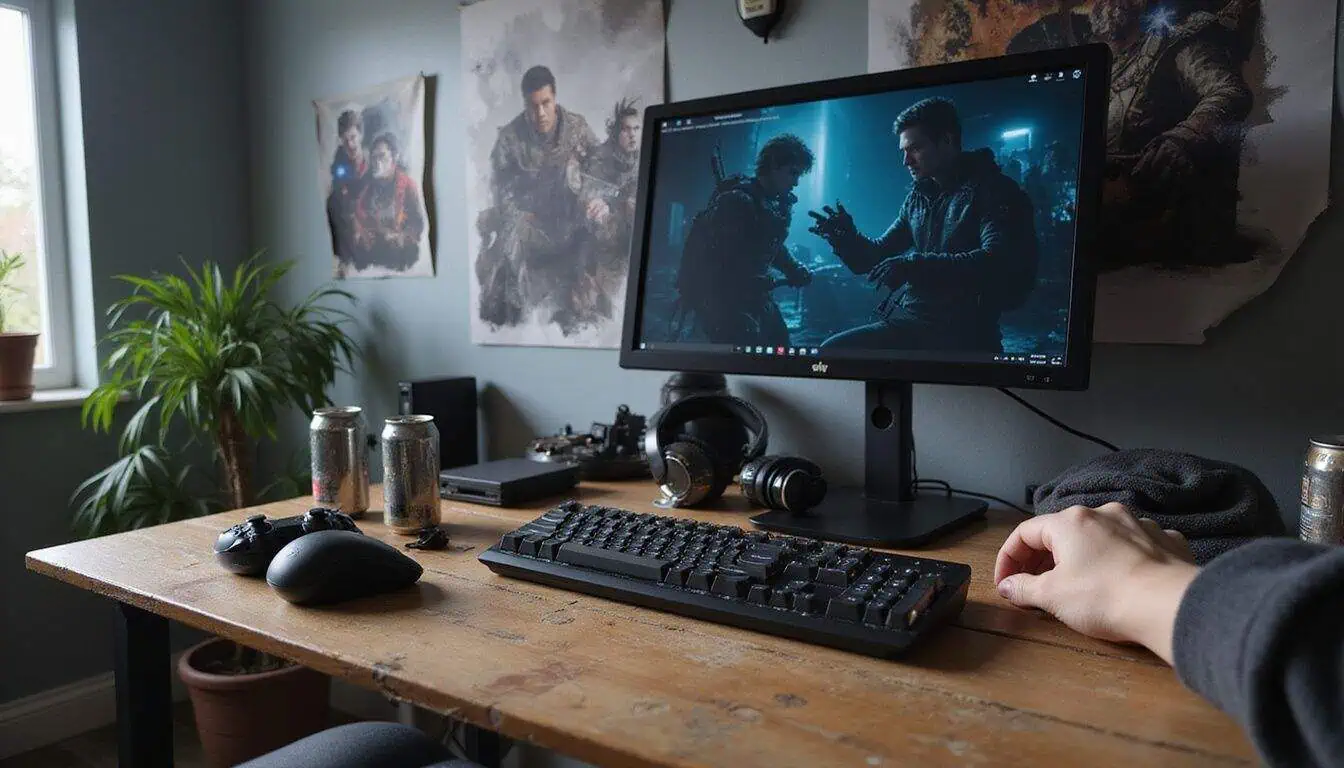
Once you’ve gained experience in your first few competitions, you’ll want to push your skills to the next level through amateur leagues and smaller tournaments. These events offer the perfect stepping stone between casual play and professional competition, giving you regular practice against skilled opponents while building your reputation in the gaming community.
How do I get involved in amateur leagues and smaller tournaments?
Amateur leagues and smaller tournaments provide the perfect stepping stone for new competitive players. These events offer real competition experience without the pressure of major tournaments.
- Sign up for ESL Play competitions – ESL Play hosts numerous amateur leagues across different games and skill levels. Create your profile, browse available tournaments, and register for events that match your experience level.
- Join local gaming cafes and community centers – Many gaming venues organize weekly or monthly tournaments for their customers. Visit these locations, ask about upcoming events, and participate in their regular competitions.
- Search Facebook groups for regional gaming communities – Local gaming groups often post about small tournaments and leagues in your area. Join these groups, stay active in discussions, and watch for event announcements.
- Register on Battlefy for grassroots competitions – Battlefy lists many amateur-level tournaments with lower entry fees and skill requirements. Filter events by your preferred game and skill bracket to find suitable matches.
- Participate in Discord server tournaments – Gaming Discord communities frequently host internal competitions for their members. Join active servers for your chosen game and look for tournament channels or announcements.
- Enter college and university esports programs – Many schools now offer competitive gaming programs and intramural leagues. Contact your institution’s gaming club or esports coordinator to learn about available opportunities.
- Look for sponsored amateur leagues at gaming stores – Local game shops often partner with publishers to host official amateur tournaments. Visit nearby stores, ask about their event calendars, and sign up for their mailing lists.
- Start with online qualifiers for larger events – Major tournaments often have amateur qualifying rounds that feed into bigger competitions. These qualifiers give you tournament experience while potentially opening doors to higher-level play.
How can I learn and improve after each competition?
Competing in smaller tournaments gives you valuable experience, but the real growth happens after each match ends. Learning from every competition helps you refine strategies and become a stronger player over time.
- Record and review your match replays immediately after each tournament – Save every game you played and watch them within 24 hours while the experience stays fresh in your memory.
- Study professional player strategies and match replays for insights – Compare your gameplay decisions to how pros handle similar situations, focusing on positioning and timing differences.
- Analyze your play styles to identify specific areas needing improvement – Look for patterns in your losses, such as weak opening moves or poor resource management during critical moments.
- Engage with forums and social platforms to discuss your tournament performance – Share clips of your matches and ask experienced players for feedback on your decision-making.
- Use resources like The Vault Ohio for gameplay analyses and expert advice – Access detailed breakdowns of advanced techniques and strategies that can elevate your competitive performance.
- Write down three specific mistakes you made during each competition – Keep a tournament journal to track recurring errors and monitor your progress over multiple events.
- Practice the exact scenarios where you struggled most – Set up custom matches or training modes that recreate the situations that caused you problems.
- Set realistic expectations to reduce pressure and enhance enjoyment – Focus on improving one skill at a time rather than expecting perfect performance in every area.
- Connect with opponents you faced to exchange tips and strategies – Many competitors are willing to share insights about matchups and techniques after tournaments conclude.
How Will Competitive Gaming Evolve in 2025?
Competitive gaming will experience significant growth in 2025, with the global esports market increasing from $2 billion in 2023 to a projected $5.5 billion by 2029. AI and machine learning will change how players train, develop strategies, and detect cheating during matches.
Virtual reality competitions are gaining popularity, featuring dedicated arenas and mixed-reality broadcasts that create immersive experiences for viewers. Mobile esports will grow faster than traditional PC titles, especially across Asia and Latin America where smartphone gaming is predominant.
Professional gamers in 2025 will benefit from structured development programs that include mental health support, coaching staff, and performance analytics. New monetization channels like media rights deals and digital merchandising will change esports economics, creating more opportunities for players to earn income.
Teams will use advanced data analysis to scout talent and improve player performance during practice sessions. The competitive landscape will feature more organized amateur leagues, giving aspiring pros clearer paths to reach elite levels of play.
People Also Ask
What are the first steps to get into gaming tournaments?
Start by mastering your chosen game and learning the competitive scene. Pick a specific game you enjoy, then practice daily to improve your skills.
How do I find gaming tournaments to compete in?
Search online platforms like Battlefy, Challonge, or ESL for local and online events. Many gaming communities also host smaller tournaments that welcome new players.
What equipment do I need to compete in gaming tournaments?
You need a reliable gaming setup with good internet, proper peripherals, and the specific game installed. Most tournaments have technical requirements listed in their rules.
How can I prepare mentally for my first gaming tournament?
Practice under pressure by joining smaller online matches first. Watch professional players compete, study their strategies, and stay calm during intense moments.
References
https://www.thevaultohio.com/post/how-to-enter-esports-tournaments-a-comprehensive-guide (2023-10-30)
https://www.redbull.com/ca-en/how-to-get-into-esports
https://www.intel.com/content/www/us/en/gaming/resources/want-pro-gamer.html
https://www.frontiersin.org/journals/psychology/articles/10.3389/fpsyg.2020.01866/full
https://www.redbull.com/us-en/how-to-become-a-pro-gamer
https://escharts.com/news/guide-services-matchmaking-tournaments (2023-09-22)
https://www.redbull.com/us-en/participating-in-gaming-events (2024-07-26)
https://britishesports.org/the-hub/advice/tournament-formats-in-esports/
https://explore.quantumfiber.com/how-to-prepare-gaming-tournament/ (2023-09-26)
https://bigcreative.education/esports-how-to-pro-gamer-compete-tournaments/ (2023-02-24)
https://8bitplay.com/blog/8-networking-tips-for-gaming-industry-events/
https://pmc.ncbi.nlm.nih.gov/articles/PMC9312023/
https://www.ticketfairy.com/blog/2025/02/14/a-complete-guide-to-esports-event-planning-in-2025/ (2025-02-14)
